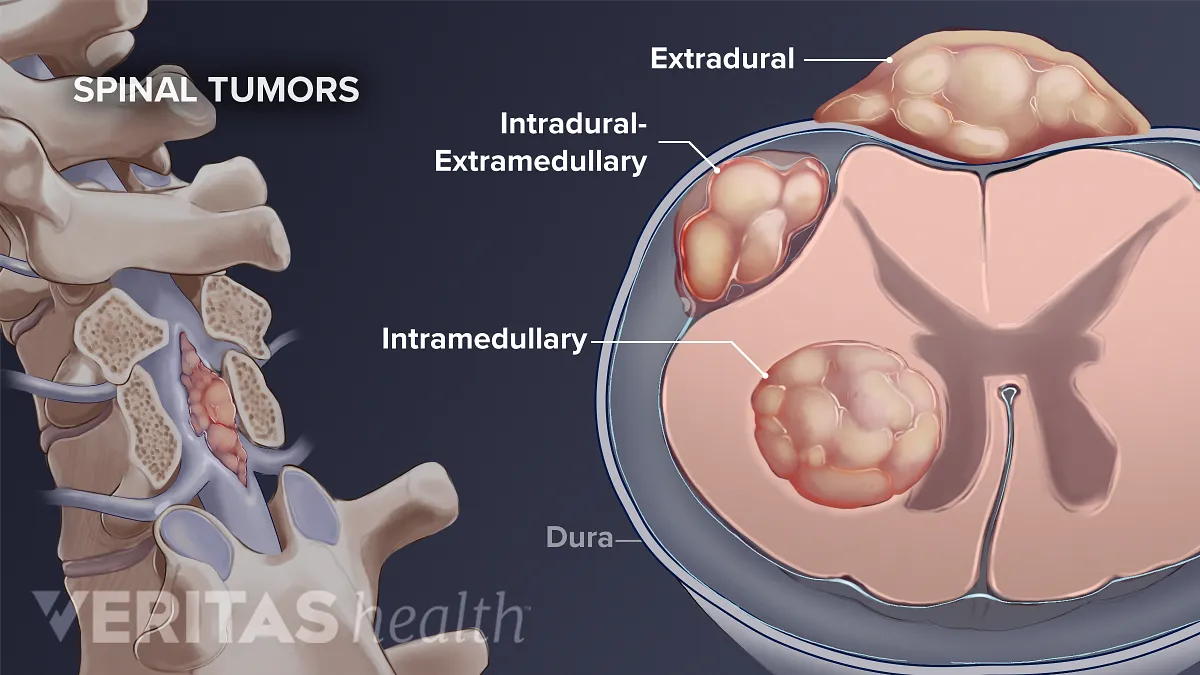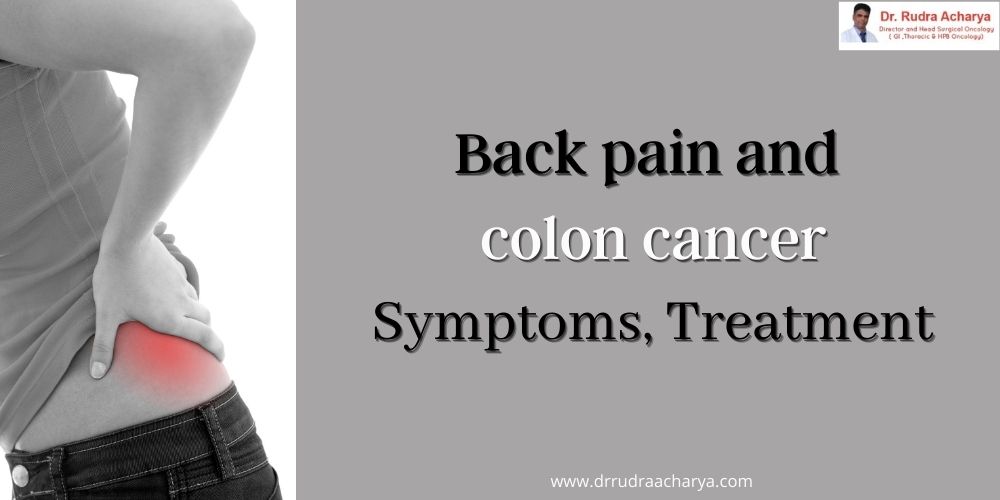Back pain can be an initial symptom of certain types of cancer, such as bone or lung cancer. Back pain can sometimes be a harbinger of a more serious condition, such as cancer.
While it is important not to jump to conclusions, persistent or unexplained back pain should not be ignored. In some cases, certain types of cancer, such as bone or lung cancer, can start with back pain as an early symptom.
It is crucial to consult a healthcare professional to determine the underlying cause and receive appropriate medical attention. Understanding the potential relationship between back pain and cancer can help individuals seek timely diagnosis and treatment, resulting in better outcomes.

Credit: www.spine-health.com
Understanding Cancer
Cancer is a complex and devastating disease that affects millions of people worldwide. While it can manifest in various ways, one of the lesser-known signs of cancer is back pain. Understanding cancer, its causes, symptoms, and treatment options is essential for early detection and improved outcomes.
What Is Cancer?
Cancer is a group of diseases characterized by the uncontrolled growth and spread of abnormal cells in the body. These cells can invade and destroy healthy tissues and organs, leading to serious health complications. The exact causes of cancer vary, but factors such as genetic mutations, exposure to carcinogens, and lifestyle choices play significant roles.
Common Symptoms Of Cancer
Recognizing the early signs and symptoms of cancer is crucial for prompt medical intervention. While back pain is not always synonymous with cancer, it is worth mentioning as it can sometimes be an indicator of the disease. Other common symptoms of cancer include:
- Unexplained weight loss
- Fatigue and weakness
- Changes in the skin, such as jaundice or excessive bruising
- Persistent cough or hoarseness
- Difficulty swallowing
- Swollen lymph nodes
- Changes in bowel or bladder habits
It’s important to note that these symptoms are not definitive indicators of cancer, but they warrant further medical evaluation. Regular check-ups and open communication with healthcare professionals are crucial in identifying potential issues and seeking appropriate care.
Types Of Cancer
When it comes to identifying the early symptoms of cancer, back pain might not be the first thing that comes to mind. However, in some cases, back pain can be an initial sign of various types of cancer. It is crucial to be aware of these types so that we can recognize potential warning signs and seek medical attention promptly.
Breast Cancer
Breast cancer is one of the most common types of cancer affecting women worldwide. Although back pain is not the most typical symptom, it can occur as the cancer progresses. It is important to note that back pain caused by breast cancer may be felt between the shoulder blades or in the upper back region. Women should regularly perform breast self-examinations and consult a healthcare professional if they experience persistent or unusual back pain.
Lung Cancer
Lung cancer is often associated with symptoms like coughing, shortness of breath, and chest pain. However, it can also manifest as back pain. In particular, lung cancer that has spread to the spine can lead to back discomfort or even fractures. It is essential to pay attention to any persistent back pain, especially in individuals with a history of smoking or exposure to smoke.
Prostate Cancer
Prostate cancer is predominantly found in men and typically affects the prostate gland. While it primarily presents with urinary symptoms and erectile dysfunction, it can also cause back pain. In advanced cases, when the cancer has metastasized to the bones, one may experience persistent back pain, particularly in the lower back or hips. Men over the age of 50, especially those with a family history of prostate cancer, should be vigilant and seek medical advice if they have persistent or concerning back pain.
Colorectal Cancer
Colorectal cancer may not immediately come to mind when thinking about back pain, but it can indeed be a possible symptom. Tumors in the colon or rectum can sometimes press against nerves or cause inflammation, leading to discomfort in the lower back. Individuals over the age of 50, especially those with a family history of colorectal cancer, should be aware of this potential link and consult a healthcare professional if they experience persistent or worsening back pain.
Other Cancers
In addition to breast, lung, prostate, and colorectal cancers, back pain can also be associated with other types of cancer. For instance, pancreatic cancer may cause back pain due to its location and potential involvement of nearby structures. Kidney cancer, bone cancer, and lymphoma are other examples where back pain can be a warning sign. Any unexplained or persistent back pain should be taken seriously and evaluated by a healthcare professional to determine its underlying cause.
Back Pain And Cancer
Back pain can be an early symptom of certain types of cancer. If you experience persistent back pain, it’s important to consult with a healthcare professional to investigate potential underlying causes, including the possibility of cancer.
Back Pain As A Symptom Of Cancer
Back pain can be a common ailment that many people experience at some point in their lives. However, it is important to note that back pain can also be a potential symptom of cancer. When it comes to cancer, back pain is not something to be ignored. Understanding the relationship between back pain and cancer can help identify potential risks and prompt early diagnosis and treatment.
Cancer can originate in various parts of the body and spread to the bone, causing back pain. Tumors that start in the spine, such as spinal cord tumors, or tumors that originate elsewhere and metastasize to the spine can put pressure on the nerves, leading to discomfort and pain. This pain may be felt in the middle or lower back.
Additionally, certain types of cancer, such as breast, lung, and prostate cancer, have a higher propensity to spread or metastasize to the bones, including the spine. In these cases, back pain could be an early indicator of the presence of cancer cells spreading throughout the body.
If you experience persistent back pain that does not seem to improve with rest or over-the-counter pain medication, it is essential to consult with a medical professional. They can conduct a thorough examination, order diagnostic tests, and determine if further investigation is needed to rule out cancer as the underlying cause of your pain.
Potential Causes Of Back Pain In Cancer Patients
In cancer patients, back pain may have different underlying causes. Some of the potential causes include:
- Tumor growth: As tumors grow in the spine or other parts of the body, they can cause pressure on the surrounding tissues and nerves, resulting in back pain.
- Compression fractures: Cancer that has spread to the bones can weaken them, increasing the risk of compression fractures. These fractures can cause severe back pain.
- Inflammation: Cancer can cause inflammation in the affected organs, including the spine, leading to discomfort.
- Nerve involvement: If cancerous cells invade the nerves in the spine, it can cause sharp or shooting pain in the back.
- Structural changes: As cancer progresses, it can cause structural changes in the spine, leading to instability and pain.
It is important to remember that not all back pain is indicative of cancer. However, if you have been diagnosed with cancer or are experiencing persistent, unexplained back pain, it is crucial to discuss your symptoms with your healthcare team to ensure appropriate evaluation, diagnosis, and management.
:max_bytes(150000):strip_icc()/back-pain-as-a-symptom-of-lung-cancer-2249303-final-f86eb298503d4b43baf1d381dd8b793d.png)
Credit: www.verywellhealth.com
Diagnosing And Treating Cancer
Early detection and diagnosis play a crucial role in successfully treating cancer. When it comes to cancer that starts with back pain, recognizing the symptoms promptly is vital. With early identification, healthcare professionals can determine the most appropriate treatment options for patients.
Early Detection And Diagnosis
Diagnosing cancer in its early stages significantly increases the chances of successful treatment. It is essential to be aware of the warning signs and consult a healthcare professional if any unexplained back pain persists. These symptoms may include persistent pain, discomfort, or stiffness in the back that does not improve with rest or over-the-counter pain medication.
In some cases, a medical history evaluation, physical examination, and imaging tests such as X-rays, MRIs, or CT scans may be required to diagnose the underlying cause of back pain. These examinations can help identify any tumors, growths, or abnormalities that could indicate the presence of cancer.
Treatment Options For Cancer
Once cancer is diagnosed, healthcare professionals create a personalized treatment plan based on the location, stage, and severity of the cancer. Treatment options can vary and may include:
- Surgery: The removal of the tumor and any surrounding affected tissues can be performed to eliminate cancerous cells.
- Chemotherapy: Anti-cancer drugs can be administered intravenously or orally to destroy cancer cells throughout the body.
- Radiation therapy: High-energy rays or particles are used to target and destroy cancer cells in a specific area.
- Immunotherapy: This treatment stimulates the body’s immune system to recognize and attack cancer cells.
- Targeted therapy: Specific drugs are used to target and inhibit the growth of cancer cells while minimizing damage to healthy cells.
In some cases, a combination of these treatment methods may be recommended to maximize effectiveness. The treatment plan will be tailored to each individual’s needs, promoting the best possible outcome.
Managing Back Pain In Cancer Patients
Back pain can significantly impact the quality of life for cancer patients. Managing this pain is a crucial aspect of cancer treatment. Healthcare professionals may recommend the following strategies to alleviate back pain:
- Pain medication: Prescription pain medication can be prescribed to manage severe back pain. Non-prescription options such as over-the-counter pain relievers may also be suggested based on the individual’s situation.
- Physical therapy: A physical therapist may provide exercises and techniques to relieve and manage back pain, improve flexibility, and restore strength.
- Supportive devices: The use of assistive devices like back braces or cushions can provide additional support and relieve pressure on the back.
- Supportive devices: Techniques such as acupuncture, massage therapy, and relaxation exercises may help reduce back pain and improve overall well-being.
It is important to communicate openly with healthcare professionals about any back pain experienced during cancer treatment. By addressing and managing back pain effectively, patients can enhance their comfort levels and focus on the healing process.

Credit: www.drrudraacharya.com
Frequently Asked Questions On What Cancer Starts With Back Pain
Can Back Pain Be A Sign Of Cancer?
Yes, back pain can be a sign of cancer, especially when it is persistent and unexplained.
What Types Of Cancer Can Cause Back Pain?
Various types of cancer, including breast, lung, pancreatic, and ovarian cancer, can cause back pain.
How Is Back Pain Related To Cancer Diagnosed?
To detect if back pain is related to cancer, doctors may conduct tests such as imaging scans, blood tests, and biopsies.
Conclusion
Back pain can be more than just a common ailment. It can also be a potential symptom of cancer. Understanding the underlying cause of back pain and seeking medical attention can be crucial in early detection and treatment. Whether it’s a dull ache or persistent discomfort, it’s essential to listen to your body and take action when necessary.
Remember, prompt diagnosis and treatment can greatly increase the chances of a positive outcome. Don’t ignore the warning signs, prioritize your health, and consult a healthcare professional if you have concerns.
